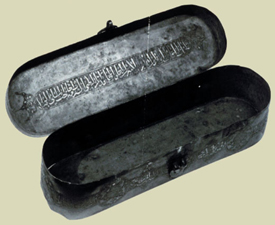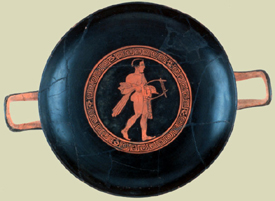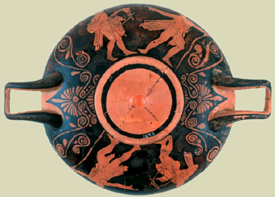|
Craft
 |
Rug factory in refugee quarters
Athens
George Swain, 12 April 1926
Kelsey Museum KS 388.4 |
The First Step
The young poet Evmenis
complained one day to Theocritos:
“I have been writing for two years now
and I have composed just one idyll.
It’s my only completed work.
I see, sadly, that the ladder of Poetry
is tall, extremely tall;
and from this first step I now stand on
I will never climb any higher.”
Theocritos replied: “Words like that
are improper, blasphemous.
Just to be on the first step
should make you happy and proud.
To have come this far is no small achievement:
what you have done is a glorious thing.
Even this first step
is a long way above the ordinary world.
To stand on this step
you must be in your own right
a member of the city of ideas.
And it is a hard, unusual thing
to be enrolled as a citizen of that city.
Its councils are full of Legislators
no charlatan can fool.
To have come this far is no small achievement:
what you have done already is a glorious thing.”
Trans. Edmund Keeley and Philip Sherrard
|
|
|
|

(top) Brass, gold, and silver pen box
Mamluk, Egypt
14th century AD
Kelsey Museum 28802
(bottom) Faience inkwell
Fayoum, Egypt
Roman
3rd century AD
Kelsey Museum 4969
|
 |
|

Red-figure kylix: (top) obverse; (bottom) reverse
Greece, 430 BC
Kelsey Museum 2601
 |
|
Poseidonians
[We behave like] the Poseidonians in the Tyrrhenian Gulf, who although of Greek origin, became barbarized as Tyrrhenians or Romans and changed their speech and the customs of their ancestors. But they observe one Greek festival even to this day; during this they gather together and call up from memory their ancient names and customs, and then, lamenting loudly to each other and weeping, they go away.
Athenaios, Deipnosophistai. Book 14, 31A (632)
The Poseidonians forgot the Greek language
after so many centuries of mingling
with Tyrrhenians, Latins, and other foreigners.
The only thing surviving from their ancestors
was a Greek festival, with beautiful rites,
with lyres and flutes, contests and wreaths.
And it was their habit toward the festival’s end
to tell each other about their ancient customs
and once again to speak Greek names
that only a few of them still recognized.
And so their festival always had a melancholy ending
because they remembered that they too were Greeks,
they too once upon a time were citizens of Magna Graecia;
and how low they’d fallen now, what they’d become,
living and speaking like barbarians,
cut off so disastrously from the Greek way of life.
Trans. Edmund Keeley and Philip Sherrard
|
|
|
|
|
For the Shop
He wrapped them up carefully, neatly,
in expensive green silk.
Roses of rubies, lilies of pearl,
violets of amethyst: beautiful according to his taste,
to his desires, his vision—not as he saw them in nature
or studied them. He’ll leave them in the safe,
examples of his bold, his skillful work.
Whenever a customer comes into the shop,
he brings out other things to sell—first class ornaments:
bracelets, chains, necklaces, rings.
Trans. Edmund Keeley and Philip Sherrard
|
|
|
Gold necklace and earrings
Egypt, Graeco-Roman period
Kelsey Museum 1985.9.1 a, b, and c
|
|
|
|